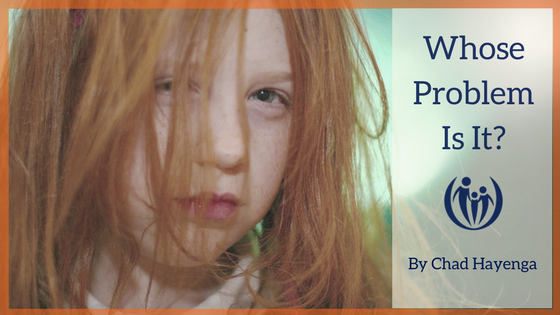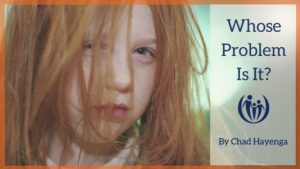
Whose Problem Is It?
Deep inside most parents is a strong urge to control their children. It may seem beneficial or even “work” for a few years, but there are diminishing returns if the goal of control is not given up significantly by the teen years (probably earlier than that).
When we take control of our kids’ lives we often end up making decisions for them that they are capable of making on their own. But maybe even worse, when we take control away from our kids we deprive them of learning that they are capable of making choices and living with the consequences whether positive, negative, or neutral. When we micromanage our kids’ lives they learn that we are responsible for their life, not them.
For example, I once coached a couple who were in the habit of commenting each morning on their teen daughter’s tangled hair and poor hygiene. They stated that most days they “couldn’t help themselves.” They felt they just had to comment, because it was such an embarrassment to them and they believed she was suffering from a lack of friendships because of her hygiene. Occasionally their strong feelings resulted in them mandating their teen to sit down so they could brush her hair for her. No one enjoyed that interaction!
Conflict often results when parents assume control of something not theirs to control. Answering the question, “Who owns the problem?’ is a great starting place to avoid this sort of conflict.
To help illuminate where the burden of the problem lies, it can be helpful to answer more specific questions like these:
- Does my child know how to ______?
- Has my child ever done this without my help?
- Is my child aware of my feelings about this?
- Does my child want my help?
- Does my child see me as an ally or a foe in this situation?
These types of questions help parents to have appropriate boundaries about problem-ownership because they remind parents of their kids’ capability. Additionally, if the answer to “Does my child know how to _____?” is no, then the parent can help the child transition into owning their problem by making sure to teach the child the appropriate skills that they’re currently lacking and then set them free to take responsibility for it.
Another key way to determine ownership of a problem is by asking, “Who cares more about the particular problem, parent or child?” If the parent tends to care more about clean dishes and rooms, combed hair, good grades and sibling arguments, then the parent owns the problem. (There may be times when a parent and child equally own the problem, like managing medications or health concerns.)
Once an understanding of rightful problem ownership has been established, helpful steps can be taken by the parent to help the child experience the weight of the problem so the child can determine what she wants to do.
Back to the couple I coached — in our session, I could see that the parents were stuck on this issue because they were involved in something that wasn’t really their problem. As I asked them questions about the conflict over their daughter’s hygiene, they determined it was clearly their daughter’s “problem,” and that since she had the necessary skills to solve it they could reframe it as her “opportunity” to grow and become responsible for her own life.
It’s not our job to take over other people’s problems — not even our kids’. It is their life, after all, right? We guide, shape and mold, but ultimately we don’t decide. We’re here to teach them wisdom and guide them, but not control their life. That’s their job!
Apply It Now:
- What areas of your child’s life are really frustrating to you?
- Do you think, based on the definition of “who owns the problem”, that it’s your problem or your child’s?
- What could you do to give the problem back to your child and help your child feel the weight of the problem while you become encourager and supporter instead?
Sign up below to receive a weekly dose of encouragement straight to your inbox:


